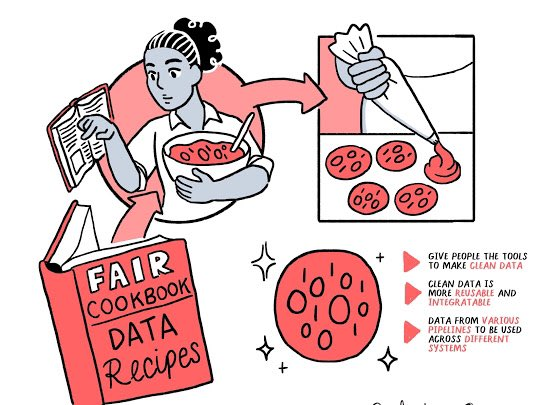Leveraging the Turing Way Book¶
The Background¶
January 2019 saw the launch of an European Union H2020 Innovative Medicine Initiative called IMI FAIRPlus.
The main aim of the IMI FAIRplus project is to assist other IMI projects make their data FAIR, i.e.
Findeable, Accessible, Interoperable and Reusable. This is no mean task, owing to the diversity and complexity of contexts in which IMI data are generated.Another goal of the project is to document the practices which allow delivery of FAIR data and enabling to change the data management culture in global organizations such as big pharmaceutical companies. While preliminary work focused of legacy datasets, more recent efforts have been directed at documenting how to ensure that data and services generated by future IMI projects can be
FAIR by-design.
With this as a backdrop, the FAIRplus Cookbook team started surveying options for a platform suited for developing and hosting documentation/training material and looked at the state of the art.
There is no shortage of frameworks, thus making choosing one a tricky business.
We already had in mind the metaphor of a FAIR Cookbook where recipes would consolidate the key steps of a procedure used for data or service FAIRification. Building on the culinary metaphor, each recipe should be listing the following:
the key ingredients
the difficulty level
the skills required
the key tools and utensils necessary for realizing the recipe
an illustration of the result
a step by step description of the process
a trial and “tasting” report, to evaluate the process and obtain feedback from users
a rating on the maturity of the process
a rating on the improvement of the FAIR level.
An invitation¶
Chance has it that Dr Sansone received an invitation
from Dr Kirstie Whitaker to join an event organized
by the Alan Turing Institute team which was developing the
‘Turing Way book of Data Science’.
It turns out to be one of the famous Book Dash events…
During the same event, Dr Sansone gave an interview to Alan Turing’s Institute team about the need to change the culture of data science around the notion of FAIR data, which ended up documented as an impact story.
For IMI FAIRPlus and for the FAIR Cookbook team, this encounter lead to 2 major breakthroughs.

Fig. 28 The FAIR Cookbook. A Data Expert cooking a recipe to make a dataset or a service FAIR. Credits to Scriberia.¶
The Breakthroughs¶
Attending the Turing Way Book Dash event was an eye opener. The infrastructure and the principles were laid out. It was both impressing and compelling. The meeting allowed two things:
Build trust in the technology stack¶
That a group was able to demonstrate the fitness for purpose of
jupyter-book
markdown and jupyter notebook
github or netlify hosting
dockerization
The reliance on jupyter-book package to provide and host content in production gave us the confidence to select
the platform since our group had identified a similar set of requirements, namely:
be able to provide web-hosted content
be able to allow collaborative, version tracked editing
be able to provide executable code
spawn execution on cloud platform
containerization for deployment behind institutional firewalls
Access to a Community of Users and Practice¶
While the availability of a documented, field-tested technical platform represented an invaluable contribution in itself, the most valuable aspect which lead us the follow The Turing Way (TTW) approach was in fact its community experience and practice, which came with.
Indeed, a more central and essential experience the TTW brought was the community building, the content creation and the
operational experience of creating and benefiting from the leverage effect that a community brings.
For instance, being able to immediately apply the onboard process, the use of technology to allow collaborative editing
of markdown document, the overall pacing and practice of organizing book bash for eliciting and organizing content
growth were just as important as the availability of a technical stack.
What now?¶
Once FAIR+ Cookbook settled on a technical solution, the project was allowed to focus on the content provision. In the last 6 months, working with our collaborators, the FAIR cookbook has seen a healthy growth of its content, now reaching 40 + recipes.
"All we had to do" was to engage, reuse and activate our community to produce content.
Of course, things aren’t necessarily plain sailing and git, markdown or python is not everybody’s cup of tea but,
as our contributors build confidence with both the tool and the process, we now focus on expanding our content.
We have also devised path to engage contributors with less intimidating technology to remain inclusive and ensure
that all could contribute. This is also why we have established an editorial team to support such contributions
and guide authors.
This is precisely this sort of experience that IMI FAIRplus project and the FAIRCookbook team want to share.
The path to FAIR data requires picking up a number of data science skills and highlighting the huge needs in training in order to bring about the necessary evolution.
Becoming a partner hub for FAIR data training¶
Having learned and benefited from The Turing Way experience, it was only natural for IMI FAIRPlus to be looking to give back to the community.
The first option of call would be to send a pull request to The Turing Way to contribute content back to the community.
However, as recently discussed during the virtual Elixir Biohackathon 2020,
Kirstie Whitaker) and
Malvika Sharan pointed out that establishing the
FAIR Cookbook was already an important contribution to the community.
As we looked into ways to establish formal cross-references wherever overlaps were found.
content from each of the resource
